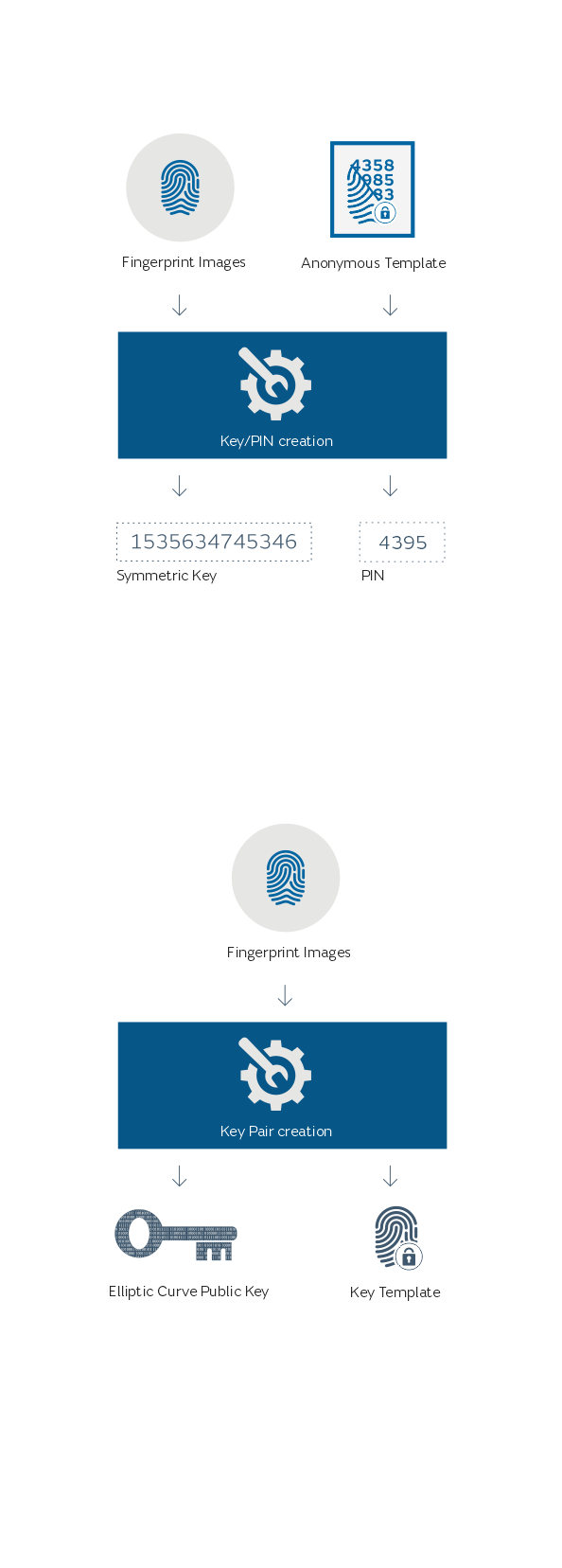Extractor SDK Overview
The GenKey Extractor SDK provides a common feature extraction format to be used across all GenKey products. The GenKey Extractor SDK is meant to be used in conjuction with one of the main GenKey product offerings (FastAFIS® SDK, BioHASH® SDK, BioHASH® BKC SDK, BioFinger SDK) to enroll or verify an image.
The GenKey Extractor SDK provides image analysis of provided images and creates extraction templates that can be further enrolled using one of the other GenKey SDKs. Additionally, information regarding the measured quality of the provided sample is provided which can be used by an application to reject image samples that do not meet a minimum level of quality. The accuracy of the system is dependent on the quality of the images used for enrollment and verification so it is important to filter images that will ultimately degrade the accuracy of the system.


FastAFIS® SDK Overview
The GenKey FastAFIS® SDK is intended for System Integrators who want to improve the matching speed of their AFIS systems. The GenKey FastAFIS® SDK, in conjunction with the GenKey Extractor SDK, contains the functionality needed to translate fingerprint images into FastAFIS® templates and to compare two FastAFIS® templates. During the comparison, a matching score is produced.
A typical use case for the SDK is to use it as a pre-filter for a 3rd party minutiae matcher. For every finger, both a FastAFIS® template and a Minutiae Template are generated. The FastAFIS® Matching Score determines if a Minutiae Template comparison is done. This effectively reduces the number of Minutiae Template comparisons that have to be done, hence increasing the overall matching speed.
BioHASH® SDK Overview
The GenKey BioHASH® SDK is designed for System Integrators who want to upgrade and extend their offerings with Private Identity Matching. The SDK offers functionality to translate fingerprint images into anonymous biometric identifiers also called anonymous templates. During verification, the software compares the image of a fingerprint with a given anonymous template to produce a similarity measure or matching score. Given a matching threshold, the application can then produce a ‘Match’ or ‘No Match’ decision.
The SDK contains state-of-the-art adaptive analog-to-digital conversion, error-correcting codes and cryptographic hash functions like SHA-256 to transform images into anonymous templates and to compare an image with such a template.


BioHASH® BKC SDK Overview
The GenKey BioHASH® Biometric Key Creation (BKC) SDK is designed for system integrators who want to offer the capability to create a reliable numeric reference from a varying biometric source. With the BioHASH® BKC SDK, this numeric reference can take the form of either a symmetric key or a Personal Identification Number (PIN). Symmetric keys can be used for symmetric key encryption applications while PIN codes can be used to replace manual PIN code entry.
The SDK can also create a public/private asymmetric key pair that can be used to digitally sign a given message using a fingerprint as the private key and later verify the signature using the public key created during enrollment. Since the BioHASH® BKC SDK is capable of creating a reliable key or PIN from a fingerprint, there is no need to store sensitive information such as the private key or PIN itself.
Symmetric Keys and PIN
To create either a symmetric key or PIN, samples of enrollment fingers are used to create a key template. The key template binds the given fingers to a randomly selected numeric reference which can be reliably determined when matching fingers are provided. The key template is stored for later use where it can be used along with verification samples to create the reliable symmetric key or PIN as needed. Note that the BioHASH® BKC SDK does not directly process the fingerprint images, but uses extraction templates created by the GenKey Extractor SDK.
Asymmetric Key Pairs
Asymmetric key pairs can be created consisting of a public and private key. The private key can be recreated whenever a key template and a matching fingerprint sample are provided. This allows an individual to biometrically sign a digital document in order to detect tampering with the document contents after signing. This SDK uses elliptic curve public/private keys to perform signing.
There are three steps required to biometrically sign and verify a digital document. The elliptic curve public/private key pair is randomly created along with a key template that binds the given finger to the key pair. The public key can be published to allow the receiver of the document to confirm the document is authentic. During signing, the key template and a new sample of the fingerprint can be used to recreate the private key and then sign the document. The digital document and the signature can then be verified using the public key. Note that no biometric component is required to verify the signature so this step can be performed without the need for this SDK.
BioFinger SDK Overview
The GenKey BioFinger SDK is intended for System Integrators who require a high accuracy fingerprint matcher and can accept lower match speed and larger template sizes than FastAFIS®. The GenKey BioFinger SDK contains the functionality needed to translate fingerprint images into BioFinger templates and to compare two BioFinger templates. During comparison a matching score is produced.
A BioFinger template may contain minutia information as well as other information describing the enrolled fingerprint. The BioFinger SDK is also capable of enrolling and matching templates in INCITS 378 (2004), INCITS 19794-2 (2005) and MINEX formats.
